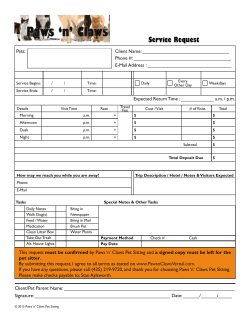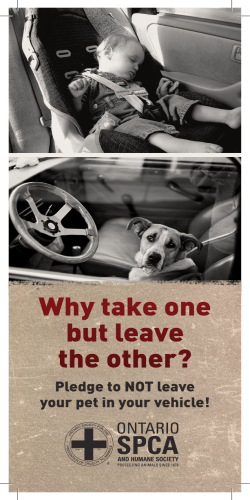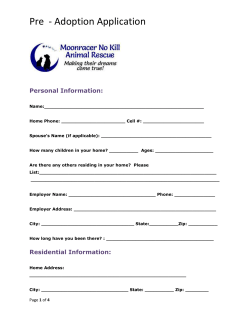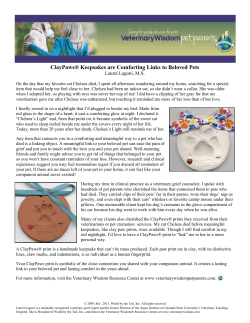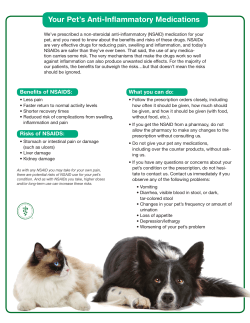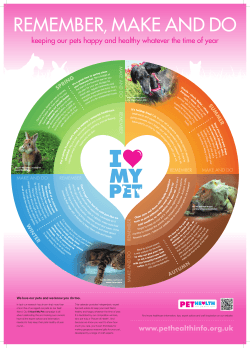
Ten ways to help cope with the loss of your pet
Ten ways to help cope with the loss of your pet 1. Give yourself permission to grieve. You’ve experienced a tremendous loss, a faithful companion who gave you unconditional love. It is normal after this loss to feel sad and worn down for a while. Take the time you need to heal. 2. Understand that guilt often accompanies grief, especially when dealing with animals. Your pet couldn’t tell you she was sick, so you may feel guilty for not taking her to the vet sooner. Or you may feel at fault if your pet was injured after escaping from the yard. Guilt is a reflection of how responsible you felt for the care of your pet; it is a human response to grieve after this loss. 3. Find a special way to say goodbye to your pet. Have a family ritual or ceremony celebrating his life and acknowledging his death. Write a letter, a poem or a special tribute. 4. Pick a meaningful way to memorialize your pet. Make a scrapbook, plant a tree, donate your time or money to a worthy animal charity. 5. Find at least one person you can talk to openly about your loss. Share your feelings without censorship. Realize that family members or other loved ones may grieve differently or be in too much pain to support you. Recognize that you may need professional help to get through this. 6. Express your feelings creatively. Write down whatever you’re feeling in a journal, without criticism. You may choose to work out your emotions in clay, paint, pastels, etc. Celebrate the life you shared with your companion. 7. When you feel strong enough, think about helping others. Speak openly and honestly with your children. Join a pet loss support group. Volunteer at the Humane Society. Find an Internet chat room for pet loss and bereavement. 8. Be especially good to yourself, because it takes a lot of energy to grieve. Try to eat well, exercise and get plenty of rest. Taking care of yourself physically can help in your emotional healing. 9. Each day, do a least one thing that brings you joy. Take a walk, garden, watch the sunset, listen to music, see a funny movie. And allow yourself to laugh! Laughter has great healing power. 10. If you decide to get another pet, do so only when you are ready. You will never be able to replace the pet you have lost; it takes time to emotionally invest in another. Cedarview Animal Hospital • 613-825-5001 • 4100 Strandherd Dr., Unit 106 • Ottawa, Ontario, K2J 0V2 www.cedarviewanimalhospital.com • info@cedarviewanimalhospital.com page 2 Book resources on pet loss and grief The following books are available from the Ottawa Public Library. Pet Loss: A Thoughtful Guide for Adults and Children By Herbert Nieburg The Loss of a Pet By Wallace Sife Coping With Sorrow On The Loss of Your Pet By Moira Anderson When Children Grieve By John James When A Family Pet Dies: A Guide to Dealing With Children’s Loss By Joann Tuzeo-Jardmen Among Angels By April Andrew When Only Love Remains (The Pain of Pet Loss) By Emily Margaret Stuparyk The following books can be found at Chapters/Indigo bookstores or online. When Friendship Lives Beyond The Stars (A Book to Help Children Cope With the Death of a Pet) By Amy Sugar Grieving the Death of a Pet By B.J. Carmack Saying Goodbye to the Pet You Love By L.A. Green and J. Landis Saying Goodbye to Your Angel Animals: Finding Comfort After Losing Your Pet By Allen and Linda Anderson How to Roar: Pet Loss Grief Recovery By Robin Jean Brown Cedarview Animal Hospital • 613-825-5001 • 4100 Strandherd Dr., Unit 106 • Ottawa, Ontario, K2J 0V2 www.cedarviewanimalhospital.com • info@cedarviewanimalhospital.com page 3 Pet loss support websites and hotline support Ontario Veterinary College Pet Loss Support Hotline 519-824-4120, ext. 53694 Grief Healing www.griefhealing.com Pet Loss Support Website www.petloss.com Rainbow Bridge www.rainbowbridge.com Pet Loss Support www.pet-loss.net Lightning Strike Pet Loss Support www.lightning-strike.com Pet Loss Support Group of Ottawa www.lookmedia.ca/plsg/index.html Grief counsellors in Ottawa Kathy Al-Zand, Alliance Counselling, 297 Sunnyside Ave., 613-730-3549 Anne Kealey Counselling Services, 267 O’Connor, 613-233-7395 John Wendell Counselling Services, 610–267 O’Connor, 613-231-8548 Elizabeth Slump, Loss and Change Educational Consulting, 613-725-2362 Cedarview Animal Hospital • 613-825-5001 • 4100 Strandherd Dr., Unit 106 • Ottawa, Ontario, K2J 0V2 www.cedarviewanimalhospital.com • info@cedarviewanimalhospital.com page 4 The grief process Although not always supported by our society, grief over the loss of a pet is a normal, healthy reaction. The passage of grief is through—not over, not by, not around, but through. It is the very difficult process of adapting to a significant loss. Although not always a linear or welldefined process, for many people grief manifests itself in several stages. These have been described by Elisabeth Kübler-Ross as: 1. 2. 3. 4. 5. Denial Anger Bargaining Depression Acceptance 1. Denial is often the first reaction to learning about the death or terminal illness of a loved one. It is a defense mechanism used to protect ourselves from overwhelming emotions. “I can’t imagine life without him,” “I can’t believe she’s gone,” “This isn’t happening, it must be a bad dream” are all familiar sayings. 2. When the reality of the situation starts to sink in, we again shield ourselves from the pain by redirecting it and expressing it as anger. Convenient targets are family and friends, our dying or deceased pet and, very often, veterinary staff. Rationally, we know these people are not to blame, but emotionally we need some kind of outlet. 3. As we begin to feel helpless and vulnerable to feelings of sorrow and loss, we try to find ways to regain control. The bargaining stage is the “could have, should have, would have” stage. “I could have saved my pet, if only I had...,” “I should have taken her to the vet sooner,” “Things would have been different if I...” 4. In the depression stage, sadness and regret predominate. This is the time when we cry a lot, feel unable to cope with everyday life, don’t eat or sleep properly and begin to feel very worn down. We often withdraw from others at this time, but this is the time we need help the most. 5. Reaching the acceptance stage of mourning is a gift not afforded to everyone, especially if we have not taken the time or effort to grieve properly, or if our grief is complicated by other factors. It is not a period of happiness but rather a time of peaceful resolution. Cedarview Animal Hospital • 613-825-5001 • 4100 Strandherd Dr., Unit 106 • Ottawa, Ontario, K2J 0V2 www.cedarviewanimalhospital.com • info@cedarviewanimalhospital.com
© Copyright 2025
